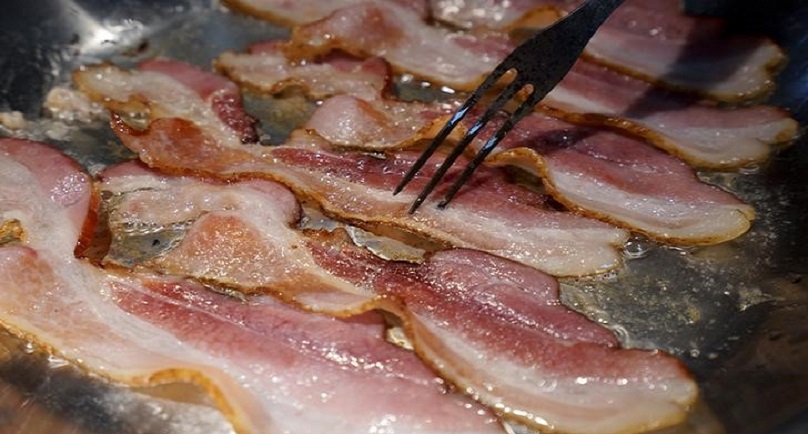Image: Bacon is fried up in a pan in a kitchen in this photo illustration in Golden, Colorado, October 26, 2015. REUTERS/Rick Wilking
By P.J. Huffstutter and Theopolis Waters
CHICAGO (Reuters) – Standing at the meat counter at a Mariano’s grocery store in Chicago, a half-dozen customers bantered with the butchers about the recent World Health Organization report linking processed meat to colorectal cancer.
“Give me two pounds of bacon,” said Roland Marks, 47, a software engineer, rolling his eyes. “I’ll take my chances.”
It is too early for consumer or retail market data to show what any longer term impacts of the report will be in the United States, or whether shoppers will shun the traditional Christmas ham this year, say industry analysts.
So far, public reaction on social media has been a clear vote in favor of all things sausage and bacon, as hashtags #FreeBacon and #JeSuisBacon joined the top-trending topics worldwide on Twitter.
The WHO took to Twitter, too, and also issued a statement to emphasize that its International Agency for Research on Cancer (IARC) review “does not ask people to stop eating processed meats,” but just indicates that cutting consumption can reduce the risk of colorectal cancer.
Monday’s WHO report is just the latest blow to the U.S. meat industry, which has seen a years-long downward trend of general red meat consumption in the country, despite the booming popularity of high-protein trends like the Paleo diet.
Controversies over antibiotic use on farm animals to fights over chicken cage sizes, have also heightened public debate over how the modern food system produces meat. Demand for organic products is growing and chicken sales are rising, in part due to lower retail prices and public health warnings over high-fat foods.
Whether the WHO report will prompt the meat industry – in particular, bacon, sausage and other processed meat makers – to shift their businesses going forward remains unclear.
But there were some signs this week that the WHO report has rattled livestock markets.
Lean hog futures prices on the Chicago Mercantile Exchange fell almost 7 percent this week in the heavily traded December contract.
Prices for pork bellies – the cut of a pig used to make bacon – took a more dramatic tumble, to their lowest level since July on Friday, at $130.31 per cwt, or hundredweight, and a far cry from this summer’s peak price of $175.55 per cwt, seen on Aug. 12.
Livestock analysts said part of the price drop was seasonal following the end of the summer bacon-lettuce-tomato sandwich demand. Prices, too, are falling amid a glut of pork bellies, partly the result of the industry aggressively rebuilding its hog herds after a deadly swine virus killed approximately 10 percent of the U.S. pig population between 2013 and 2014, say livestock analysts.
But the severity of the price drop had some livestock market analysts blaming the downturn on the WHO report.
“This market was in solid shape a week ago,” said Dennis Smith, a broker with Archer Financial Services in Chicago, noting that by
Thursday wholesale ham prices had also dropped, down 20 cents per pound since the news came out.
“The consumer maybe hasn’t even reacted yet, but the futures market is telling you the reaction is going to be a negative,” Smith said.
(Reporting by P.J. Huffstutter and Theopolis Waters; Additional reporting by Michael Hirtzer in Chicago and Crispian Balmer in Rome, Italy; Editing by Leslie Adler)
Copyright 2015 Thomson Reuters. Click for Restrictions.


